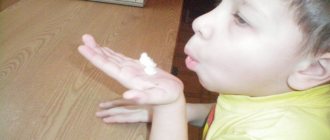Causes of delayed speech development
Neurological health problems are often the cause of speech delay. The baby speaks poorly at 2 or more years of age, and sometimes remains completely silent. In such cases, the baby needs medical care, and the sooner this happens, the easier it is to cure the pathology.
The main causes of speech delay include:
- chronic diseases of the mother, damage to the central nervous system (CNS) that arose during the intrauterine development of the fetus or in the postpartum period;
- addictions (smoking, alcohol, use of narcotic, psychotropic drugs);
- use of medications contraindicated during lactation and pregnancy;
- late toxicosis (preeclampsia) and the threat of fetal loss;
- taking prohibited antibiotics;
- prematurity or prolonged labor;
- oxygen starvation (fetal hypoxia);
- traumatic brain injury during childbirth;
- infectious diseases (scarlet fever, rubella, measles, whooping cough, etc.) suffered by a child at such an early age;
There are also physiological reasons why a child does not want to speak or speaks very poorly, these can be:
- hearing loss (hard of hearing, deafness), as a result of which children’s perception of sound and the process of speech formation deteriorate. If at the age of three the baby does not speak, although he previously showed the urge to talk, you should visit an otolaryngologist. Perhaps the baby has a congenital or acquired pathology of the hearing organs;
- insufficient development of the speech apparatus - profuse salivation and an open mouth are noted. With pathology of the jaw and facial muscles, it is difficult for the child to reproduce sounds, he cannot swallow solid food, nausea and vomiting appear;
- hereditary diseases or genetic predisposition (for example, slow growth of nerve cells in one of the parents) can also cause speech delay in children;
- infectious diseases that affect the fetus during pregnancy. As a result, the baby’s process of developing speech activity is disrupted, which negatively affects his development and communication between people;
- brain pathology or “autism”. This painful condition results in the baby being unable to speak clearly or trying to avoid contact with others.
If, according to medical indicators, everything is normal, however, the child at 2 years old does not yet speak, or is poorly able to name phrases of 2-3 words, the reasons may be of a social nature, namely:
Adults do not pay attention to children. A lack of communication and neglect hinder speech activity, the child becomes withdrawn, there is no interest in the environment and a persistent reluctance to talk appears. Stress, frequent quarrels in the family, fear. Such psychological disorders slow down the emergence of speech
To identify psychological trauma, you should pay attention to the child’s behavior. If he often shakes his arms or legs during feeding, screams when a stranger appears, or has problems with urinary incontinence, you should worry and consult a doctor. Overprotectiveness
The baby desperately needs communication and closeness from mom and dad. However, if you overdo it with guardianship, fulfilling all the desires and whims of the child on demand, then he will no longer have the need to talk. What for? After all, you can simply point to the item of interest, play around a little and get what you want.
When to sound the alarm
At the age of two, you need to be able to construct simple phrases (2-4 words), use at least 50, and preferably 100 words. Onomatopoeias can also be considered words, for example “beep” instead of “car”.
Start taking action if your child:
- does not try to learn new words;
- uses fewer than 20 words;
- does not even form two-word phrases;
- does not know the names of objects around, body parts, etc.;
- cannot point to objects known to him or bring what is outside his field of vision.
Let's look at some more factors.
Should we wean off the breast and pacifiers?
There is a common belief that you need to wean your child off breastfeeding before the age of 2, otherwise he will most likely speak late. In fact, this statement has no sufficient basis. Breastfeeding determines the structure of the bite and face. Experts are confident that children who have been breastfed for a long time (up to 2 years or more) reproduce sounds better, they are less likely to have speech disorders, and if they do occur, they are easily corrected.
Speech allegedly also develops poorly in those who do not part with a pacifier (pacifier), especially if the pacifiers are not special orthodontic ones, but regular ones. This is partly true. A pacifier puts a child into a trance-like state; he does not listen to adults, and is not particularly interested in what is happening around him - therefore, cognitive processes slow down. In addition, if you cover a baby's mouth with a pacifier while crying, it does not release emotions, which can negatively affect the mental state, and in the future, the development of conversational skills.
However, in both cases there is no particular cause for concern. You just need to remember that everything is good in moderation. Research by the World Health Organization proves that regardless of the feeding method, children grow up to be well developed physically, personally, and intellectually.
Speech negativism
Try not to ask your child too often to say or repeat something after you. Otherwise, you may unwittingly develop the habit of refusing to speak: the baby will be stubborn, openly or covertly, but will not speak out at your request or even respond verbally. This habit is called speech negativism.
A son or daughter may have everything in order with hearing, but there is no desire to repeat words, but the obvious ones are refusal to answer questions, pointing with a finger when asking for something, satisfying needs on their own. You can’t help but like independence, but if a child refuses to comment on his own actions, be wary: this means that communication skills have not been developed, and there is verbal negativism. And if you encounter this phenomenon, do not scold your child, much less punish him.
How to help develop speech by age
Up to a year old, the baby makes his first attempts to speak - he smiles in response to visual and verbal contact with adults, tries to say some sound or even repeat after mom or dad. Therefore, it is very important to focus on these attempts, smile, look at the baby, showing in every possible way that you are interested.
1-3 years. At this age, mothers and fathers, when communicating with a child, try (on an unconscious level) to speak to the baby in his language - briefly, understandably, clearly. Thus, the child understands what is being said to him, what he wants to say. Try to get rid of baby talk and empty repetition (such as “ba-ba”, “peek-a-boo”). The child must hear the words in full so that later he can say them the same way, and not shorten the syllables, rearrange them, distorting the meaning. Correct speech stimulates communication.
From 3 years and older. The most common opinion of most modern parents is that by sending a three-year-old child to kindergarten, the pace of communication can be slowed down, and all the necessary speech skills will be developed by the employees of the child care institution. This is wrong. Parental communication remains just as important, because it is in the family that the foundations of communication are laid, on which the rest of the acquired knowledge will be superimposed.
Advice from experts on speech development in children under 3 years of age
Parents often begin to panic when their child does not want to start talking. Regarding difficulty speaking, authoritative pediatrician E. O. Komarovsky says the following:
“Speech difficulties may be caused by the fact that adults do not actively communicate with the child. But when the baby goes to kindergarten, he will make up for lost time, as children quickly try to adapt in society, purely instinctively. But there is a high probability that he will have problems with pronunciation, so it is better to work with the child from an early age.”
R. Levykin, psychologist:
Useful for speech development:
- Talk to your child as much as possible and encourage him to speak as much as possible. Ask him questions. Ask for his opinion. Comment on your actions.
- Develop your horizons. Walk more: gardens, playgrounds, parks, museums, zoos, walks in the forest, etc.
- Develop hand motor skills: plasticine, paints, crafts made from natural materials, construction sets.
From the book by I. A. Ermakova “Talk to me, mom! Educational activities for kids":
Speech therapy massage of the facial muscles helps correct speech development. A light massage of the cheeks, forehead, and lips helps regulate blood circulation, improves muscle elasticity and serves as an effective way to prevent speech disorders. Light circular movements should be performed with the fingertips of both hands so that folds do not form on the skin. The massage should be done slowly and smoothly for 2-5 minutes 2 times a day. The duration of the course is 10-15 sessions. Before starting the massage, you need to cut your long nails, thoroughly wash and warm your hands, and lubricate your fingertips with nourishing or baby cream.
- Perform light circular movements from the middle of the forehead to the temples.
- Perform light circular movements from the middle of the forehead to the earlobes.
- Perform light circular strokes under the eyes from the nose to the temple area.
- Perform light circular movements from the middle of the forehead to the neck.
- Perform light circular movements from the wings of the nose to the corners of the lips.
- Perform light circular movements from the wings of the nose to the earlobes.
- Perform light circular movements along the contour of first the upper and then the lower lip - from the corners to the middle.
- Lightly tap your lips with your fingertips.
- Perform light circular movements from the middle of the upper lip to the chin.
Yu.S. Kosmina, speech therapist of the highest category:
In the family, conditions must be created for the child so that he experiences satisfaction from communicating with adults, receives from them not only new knowledge, but also enriches his vocabulary, learns to construct sentences correctly, pronounce sounds clearly, and tell interesting stories.
By expanding the child’s range of ideas about surrounding objects and phenomena, talking with him on various everyday topics that are close and understandable to the child, parents will thereby not only expand his horizons, but also contribute to the mastery of correct speech.
Speech pathologist-defectologist Anna Makovey about methods of speech development in twins:
Twins are a special topic. They have each other and that says it all. A special language, complete mutual understanding and no incentive to master the generally accepted language. It seems to me that the most humane of all the tested means (here is separation/distribution to grandmothers and division of responsibilities for raising each person between father and mother) is the introduction of children into a group of peers. There, children realize the need to master speech and learn to voice their needs (which is vital in kindergarten).
Individual communication with parents also helps to “talk” such children. It's up to your imagination and resourcefulness. One goes with dad to the store for... (something very necessary!!! You can’t handle it alone!), the second stays with mom... boil the kettle, wash the dishes, etc.
Don’t worry if your child doesn’t start talking at 1.5-2.5 years old. You should be afraid if a child at 3 years of age does not want to utter a single sound. This is a reason to contact a specialist who will help you find the answer to the question of why the child cannot speak.
Teach your children, develop their speech, thinking, memory, because a lot depends on the parents. And with such a set of modern techniques, books, educational games, you can decorate not only your baby’s everyday life, but also your own.
Development of verbal abilities
The basis for developing verbal skills is constant communication with relatives. With parents who are good conversationalists and can monologue for a long time, the child begins to talk much faster than in families where the mother prefers to mind her own business and does not like to talk with her baby.
Fine motor skills also influence the formation of the speech apparatus. You need to massage your fingers more often, play games with small objects, and use special techniques to develop motor skills.
“We should not forget that each toddler is an individual, so there is no need to look up to other children and worry if at 1.5 years the child cannot say a word.”
Constant communication
To teach a baby to speak at an early age, the mother needs to constantly talk to the child , tell him about what is happening around him. For example, in the kitchen you can comment on the cooking process. When dressing for a walk, explain the name of this or that item of clothing, pronounce the colors and qualities of the items.
At the same time, it is recommended to talk with the baby as with an adult interlocutor, even if he cannot yet carry on a conversation. And be sure to praise him if he tries to repeat sounds made by adults. This will stimulate the baby for further development.
“It is important to pay special attention to the words “dad” and “mom”, pronouncing them with special intonation.”
Introduction to the alphabet
A one-year-old child can already be shown letters , because he begins to be interested in the surrounding sounds and tries to reproduce them. Classes should be held in a playful way, and if the baby is not ready to sit near his mother for a long time and learn letters, then there is no need to force him to do this.
Mom should explain to him how “the machine does”, “the cat (dog, cow) says.” At the same time, you should learn to be patient and not demand too much from your child. You need to repeat the words in a friendly tone. While reading fairy tales, you need to let the little one look at the pictures in the book and explain what is drawn on them and what connection they have with what they read.
“You need to read poems or children's stories not monotonously, but emotionally, with expression and appropriate facial expressions. The main thing is that the books are interesting to the child and appropriate to his age.”
Finger gymnastics
The speech center is located in the cerebral cortex next to the area that controls the movements of the hands and fingers. Therefore, by stimulating the limbs, it is possible to have a positive effect on speech development. The following exercises are recommended:
- "Palms on the surface." The baby needs to be seated at the table and his hands should be placed palms down. Mom says “one” - fingers apart, “two” - together.
- "Fingers say hello." The baby sits with his arms outstretched and on the count of “one” connects all the fingers of the right and left hand, then alternately index with index, little finger and little finger, etc.
- "Little man." The fingers alternately “run” across the table, imitating a person’s walking.
- "Glasses". The little one should show what the glasses look like by putting his fingers to his face.
- "Trees". On the count of “one” - arms above your head, fingers together. On the count of “two,” spread your fingers. “Three” - hands in front of you, connect with the back, fingers should be down (show the roots of the tree).
- "Spider". Bend your fingers and slowly move them across the table (like a spider crawling).
- "Table". Make a fist and cover it with the palm of your other hand.
- "Hide and seek." The child must clench and unclench his fists.
- "Orange". To the rhyme “We shared an orange,” the baby should bend his fingers one by one.
- “Come on, brothers.” One handle is unclenched, and the index finger of the other hand alternately taps the unclenched fingers on the other.
- "Scarlet Flowers". The baby should connect both palms, and then slowly open his fingers (as if a flower is opening) and shake them. After this, the fingers close (the flower falls asleep).
- "Squirrel". Place your hands in front of you, palms up. The right hand should be suspended, and the index finger of the left moves along the palm, and then bends the fingers of the right hand in order: the squirrel on the cart sells delicious nuts - to the sister fox, the fat-fifted bear, and the feathered sparrow.
- "Bridge". The baby raises his hands above his head with his palms facing each other, and then crosses his fingers to a horizontal position, connecting his middle and ring fingers (the bridge is opened).
- "Chamomile". Interlace the fingers of the left and right hands with each other, and then spread the straight fingers to the sides (chamomile petals).
- "A barrel of water." The baby squeezes his left hand into a fist, leaving a small hole, and then repeats the same with his right hand.
- "Bee". Use your index fingers to alternately make rotational movements in a circle.
- "Sunshine". Raise your arms above your head, crossing your fingers together, and then spread your fingers out to the sides.
Some practical tips
Sometimes, to “start” speech, it is enough to slightly change the conditions in which the child is.
To do this, it is not necessary to use expensive toys or speech development kits.
We create difficulties
Neurologists and psychologists advise that in order to get a child to talk, respond as little as possible to his gestures and requests in the form of mooing. It is worth noting that this is relevant for children aged one and a half, two years and older.
But when faced with difficulties, the speech centers of the brain begin to work more actively. Therefore, many “non-speaking” children begin to actively talk while attending kindergarten.
Actively read and listen to fairy tales
Kids love bright pictures. Therefore, reading books fascinates them. While the child looks at the picture and listens to rhymes or mini-fairy tales, he remembers new words.
If you can’t read books with your baby for hours, play audio fairy tales for him. Constantly hearing speech will stimulate the development of the child’s speech centers.
Music is another helper
Play classical music for your baby, it stimulates brain development. Many experts recommend Mozart. His works are more easily perceived by children.
When the child begins to speak his first words, you can turn on the simplest children's songs and try to sing them with him. This not only stimulates the musical ear, but also speech.
Discourage babbling and autonomous speech
It is a mistake to lisp with a child and communicate with him in his “bird” language
It is important for babies to see normal articulation and hear normal adult speech
Some psychologists believe that lisping and imitation of baby babble are appropriate up to six or eight months.
Expand your active and passive vocabulary
For normal speech development, it is important not only to stimulate the child to pronounce new words. But also to replenish his passive vocabulary
That is, words with meanings that he knows, but cannot yet pronounce.
To do this, try to name the things around your baby as often as possible. And for classes, use not only picture books, but also household items. He will better remember what he saw in person.
You can teach a child to speak at 1.5 years old by expanding his active vocabulary. Ask your child to repeat simple words after you (cat, house, etc.). Remember that repetition and regularity of practice is the key to success.
Discuss and ask questions
This rule is best suited for children aged 1 year 9 months and older. The need to answer the question stimulates the speech centers.
With children over one year old, it is necessary to discuss what is depicted on them while looking at the pictures. Tell your child what exactly is drawn, encourage him to show some object.
Play actively
Mini-performances can be organized for children aged one year and older.
You can make up stories yourself or act out scenes from cartoons or fairy tales. A surge of positive emotions and the speech of an adult stimulates the child’s desire to speak.
Stimulate fine motor skills
Let your child play with cereals (buckwheat, rice, millet). Let him have objects with different textures on hand - wood, plastic, wool, cotton.
And if you make a development board for your baby with various latches, hooks, and switches, you will get, in addition to speech development, from 15 to 30 minutes of free time.
Reasons for concern
The formation of verbal skills should not be left to chance, so that by school age the child has the necessary vocabulary and knowledge. If situations arise when you need the help of a specialist, you should not refuse it and try to straighten out the situation yourself. So, the following points should be cause for concern:
- A 1-year-old child does not understand that he is being addressed. Also, the baby cannot point a finger at his mother when asked to do so.
- Complete absence of speech at two years.
- The inability to pronounce basic phrases by a three-year-old child (“Mom, give me”, “I want to pee-pee”).
- Increased salivation after 3 years.
- Inability to smile or stick out tongue.
- Simplification of words by a 3-year-old child (car - “bi-bi”, drink - “pi”, candy - “chum salmon”).
- Distortion of words beyond recognition after 3 years.
- Nasal pronunciation of words or phrases.
- Lack of air. The baby picks it up while pronouncing the phrase.
Among other things, to stimulate a child’s verbal skills, there is no need to allow the child to watch other people’s games on the computer, turn on the tablet with cartoons and surround his playing space with other devices in which he becomes not an active participant, but a passive observer. The key to developing a child’s speech is constant communication, educational games and exciting activities. If after several months of training you do not see any results, you need to seek help from a specialist.
Talk to your child constantly
Any interaction with the baby should be accompanied by a discussion of what is happening - whether you are going for a walk, starting a meal, changing your pants. Tell your baby about everything you do, name the objects you use. “And now we will change clothes! We'll wear green pants!" After repeated mention and demonstration of actions and objects, the child begins to understand what individual words and then short phrases mean.
Here's what to remember when communicating with your child:
Avoid two extremes: stinginess with words and verbosity. If you keep telling your baby everything in a row, then the word that the child should remember will be lost behind the flow of words, and all your speech will merge for the baby into one incomprehensible whole. In a conversation, it is necessary to highlight the names of objects and actions. It is very useful to speak in short sentences (two words) or simply name objects and actions in monosyllables. “This is a spoon” “The bear is eating”
Before going into more detailed descriptions, give your child time so that he can comprehend your words, get acquainted with new objects, and hold them in his hands. Your speech should coincide with the moment of showing the object and action. Tell your child rhymes and nursery rhymes more often; they are emotional and rhythmic, so they immediately attract the child’s attention and are easier to digest than ordinary speech. After 6 months it is very useful to play the simplest gesture games. It is advisable that during a conversation the baby sees your face, because he not only listens, but also carefully watches the movement of your lips. Speak expressively because
the child first of all picks up intonation When talking with a child, constantly ask him questions and try to wait for his reaction. “What a beautiful doll, do you like it?” The answer can be in any form - laughter, humming, grumbling. You should show interest in each answer: “Really?”, “That’s how interesting!” By acting in this way, you seem to invite the baby to enter into a dialogue with you, motivating him to say his line.
Gesture, this will help the baby understand the meaning of your words. But don't overdo it! Do not use contrived gestures, but only those gestures with which you would naturally complement your statement. For example, you can raise your arms high to show how big your daughter has grown, or wave your hand invitingly, saying “Crawl here!”
Child speech development from 1.5 to 2 years
From the age of one and a half years, the baby’s vocabulary begins to grow rapidly: the number of words he understands increases significantly. Both quantitative and qualitative changes occur. Lightweight children's language moves to a qualitatively different level. The process of mastering the simplest norms of the native language begins. The phrase appears for the first time. At first, sentences are used in a “telegraphic style”; there is no grammatical design. But, despite this, the baby has the ability to very accurately feel the rather subtle features of the word use of adults and tries his best to say the same in independent speech.
The baby begins to vary intonation when pronouncing words, using its different shades to express the meaning of his statement. First, he copies the intonation of his parents, repeating after them the questions addressed to him. Then the child uses this interrogative outline independently and gives the expressions a questioning tone. He asks a question without using question words.
At the same time, the most commonly used imperative verbs appear, used to obtain from adults the performance of any specific action. It must be remembered that initially verbs are used by children in isolation; only at the age of about 2 years are they used to construct a sentence. After mastering several dozen words, the child begins to construct the first simple sentences of 1-2 words using a subject and predicate. Verbal vocabulary has a major influence on the formation of detailed speech.
Thus, the most important step for speech development taken by a baby is the gradual transition from babbling to full-fledged words, from “word-sentences” understandable only to those close to him, to an elementary two-word phrase, the meaning and meaning of which is understood even by strangers.
The content side of a child's statement undergoes fundamental changes: the baby becomes able not only to express his emotional state or momentary desire, he names objects, distinguishes between their properties and the actions performed. You can already have a full dialogue with him.
Important tips for speech development
So, how to teach a child to talk? All the tips that will be discussed below will help parents teach their child to speak. These recommendations are supported by leading speech therapists who constantly work with children and have seen the results of this work.
Parents need to constantly monitor what their children say and how they say it. This will help you notice shortcomings earlier and work on them. Correct speech in children is the key to good development of thinking.
This means that such children will study better, master a large amount of information and in the future easily communicate with people.
Many of the tips from this article are also relevant if you want to teach your child to talk at 2 years old.
Expanding children's vocabulary is possible through the following actions:
- Create a game with your child in which an object will be shown, its name will be pronounced, its action and what it is needed will be explained.
- Parents must follow a clear sequence in this game:
- say the name of the item;
- look at it carefully with your child;
- name individual parts of the object;
- teach the baby how to handle the thing and show what actions it can perform;
- give children time to look at the object carefully and play with it.
By the end of the 3rd year of life, children already have a vocabulary of about 1 thousand words. Everyone develops under different conditions, and the number of words a baby knows depends on this. Therefore, it is necessary that children communicate with a large number of people, show initiative and strive to explore the world around them. In the future, this will help quickly teach the child to write correctly.
Perhaps the use of cut-out pictures for children 2-3 years old, which we mentioned earlier, will also help you.
Stimuli for speech formation
To quickly teach a child under 3 years old to speak, you need to encourage him in every possible way to pronounce words and communicate. There are simple but effective ways to do this
- Refusal of the pacifier. Infants who suck a pacifier begin to talk much later than children who are completely unfamiliar with this subject. The thing is that during prolonged sucking, the muscles involved in the formation of speech practically do not develop.
- Expanding vocabulary. If a two-year-old child already speaks some words, you need to show him something new more often and be sure to explain in detail the purpose of this item, expanding his vocabulary.
- Outdoor games. In children of the first years of life, the psyche is not yet strong enough to withstand classes and sit calmly in one place for a long time. Therefore, learning new words should take place exclusively in the form of a game.
- Articulation gymnastics. It is recommended to train the muscles of the tongue with the help of special exercises (pull your lips together, blow on a piece of cotton wool with a straw, lick jam with your tongue, make a clicking sound, puff out your cheeks).
- Verbal mirroring. Mom needs to repeat all the phrases and syllables that her baby says, and then say her words so that the child repeats them. This fun game will help a 2-3 year old child speak faster.
- Limb stimulation. Speech therapists are convinced that playing with small objects leads to the early development of speech in a child. You can draw on scattered sand or cereals, string small beads on a ribbon, or do finger exercises to stimulate the nerve endings on the child’s fingers.
- Daily reading. At one year old, the baby will actively look at colorful pictures, and with age he will begin to listen carefully to fairy tales and retell them.
- Learning children's songs. Smoothness of phrases and positive emotions stimulate the development of the speech apparatus.
- No background sounds. During classes, the TV or computer should be turned off so that the baby is not distracted by extraneous sounds and does not stare at the flashing frames.
- Special pronunciation of incorrect words. This method should be used while reading rhymes well known to the child or telling fairy tales. For example, you need to say that the grandfather planted not a turnip, but a cap, and give the baby the opportunity to correct his confused mother.
- Speech without simplifications. If the mother, in the presence of the child, calls the car “bibika” and the cutlet “chum salmon,” then the baby will remember simplified variations of the words and will pronounce them on a subconscious level.
- Replacing gestures with words. If the baby, instead of answering, simply nods or points a finger at an object, you need to pretend that the mother does not understand his gestures, thereby pushing him to utter a word. However, you should not go to extremes and bring your child to tears.
- Showing interest. Many mothers want to teach their child to speak at 3 years old, but do not take his attempts at verbal explanations seriously. You need not only to take the initiative in communicating with your little interlocutor, but also to be an attentive listener to him, ask questions, sincerely express emotions and admire when he tries to tell something.
When does a child begin to say his first words?
Starting from 1 year, the baby begins to actively move around the house, thereby gaining new experiences. The experience gained is reflected in speech development.
Often, a baby speaks its first words between 9.5 months and 1 year 6 months. Most often, the first words are what he hears most often - dad, mom, grandma or uncle.
Features of speech learning for a baby from six months to 1 year
At 6 months, the baby knows his name and turns his head if it is pronounced. During play, experts recommend asking questions that would prompt the child to say the name of the toy he is playing with. Always respond to his babble and gradually teach him to pronounce short words that consist of several syllables.
The period from 8 to 9 months is the best time to teach your baby to imitate the sounds of different animals. Show everything by your example.
Very often, to develop the speech apparatus, they use a game in which you need to show a part of the body and name it.
Features of speech development in children from one to 2 years old
How quickly a child learns to speak directly depends on how often his parents talk to him. At the age of 1 year, children not only understand that they are being addressed, but also know how to speak short and simple words. As the baby begins to walk, his vocabulary will begin to increase.
For effective development, you can use the following games:
- Games that help develop intonation. For example, you can put a toy lion and a cat in front of a child, and give him the task that he meowed like a cat, and then roared like a lion. This exercise is good for developing vocal timbre, and it also teaches you to quickly change intonation.
- Ask your child to name and show what toys he has. This is an excellent exercise not only for the development of the speech apparatus, but also for memory.
- While looking at pictures in a book with your child, ask him to say what the person in the picture is doing and what else he sees.
How to teach a baby to speak in simple sentences?
Please note that coherent speech is formed only by the age of 3. In order for children to start speaking in sentences, parents themselves need to speak in simple sentences
Ask your child to describe what he is doing or what others are doing. Show him an example, let him repeat simple sentences after you first. Try to play games that involve the baby's direct speech.
Four basic tips to help your child develop speech
Articulation gymnastics classes will be useful. These exercises can be done even with babies.
Please note that such activities will be most useful until the baby learns to speak clearly. Listen carefully to what your child has to say. Give him feedback with a response phrase
Active listening is necessary in order to correct the baby during speech, thereby correcting it. During correction, use clarifying questions, ask again and ask to repeat the spoken word. Read aloud. Children who listen to their parents speak faster begin to speak themselves. Thus, the baby learns more words, thereby making his speech richer. Sing songs and learn simple poems. So, the child will be much more interested in learning.
Why may there be delays in the speech development of children?
Often the reason for late speech development is that children do not receive the necessary communication. Busy parents often surround their baby with various technologies: TV, tablets, and this negatively affects the baby’s development. What he needs is live communication. This is explained by the fact that the baby hears speech on TV, however, he does not understand that it is addressed to him.
Sometimes the reason that children do not begin to speak clearly for a long time is that parents understand the baby’s babble well. Instead of encouraging the baby to speak correctly, parents begin to guess what he wants to say. Excessive baby talk can have a negative impact on your baby's development.
Speech problems can also be caused by the fact that the child is disobedient or very active. Such a child becomes absent-minded and does not try to remember and reproduce new words. Instead of listening to what mom or dad wants to say, the baby begins to scream and interrupt communication.
As a result, it should be noted that each child develops differently. Some people start speaking very early, others with a slight delay
Despite this, parents should pay great attention to the development of correct and competent speech. However, remember that everything should happen in a playful way, the baby should like such activities
How to teach a child to speak words correctly
Over time, it is always possible to tell the child how to speak correctly. The main principle here is do no harm. Under no circumstances should you shame your child or express your concern that something is not working out for him. Firstly, this is how you can raise a child who is insecure. Secondly, the child may return to the previous level of development and completely forget how to talk.
The main reason why a child’s speech development is delayed is the small number of social contacts with the baby. She simply does not study in such a sluggish mode. If your child is 1 year old and doesn’t speak, you don’t have to worry.
The child may also experience speech problems due to hearing problems. Another common reason is individual mental characteristics. Introverts talk less from a very young age, so there is no need to worry about this. If there are any suspicions, it is better to have the child checked by a defectologist. He knows better when there is cause for concern.
If a child babbles until he is two years old, but cannot yet speak meaningfully, there is no cause for concern if he understands what is wanted of him.
In a word, in any area where it comes to the development of a child, parents tend to panic over trifles. In most cases, the main assistant in teaching children to speak is calmness and patience.
Stress
Any changes are stressful for the child. This could be a move, the arrival of a new family member, or, conversely, leaving (parents’ divorce, a friend asked to stay for a week, and so on), and all this affects the development of speech. The baby needs to adapt to the new environment, only then should he continue his education.
Avoid quarrels in front of the baby, do not scold animals in front of the child. Children are greatly offended by unfair punishment: if they dropped something, they put them in a corner, they scolded them, or the parents are simply in a bad mood, they grumble, do not pay attention, and so on.
The environment in the family should be healthy and calm, only in this way will the baby develop on time and fully.
We talked about what a child should say at 1 year old. We also figured out the reasons why speech development may be delayed. Now let's look at tips that will help you quickly teach your baby to speak.
How to quickly teach a baby to talk at 1-2 years old
Many parents are waiting for the period when the child begins to consciously pronounce words and simple phrases. But not all children begin to speak by the age of 1-2 years. In this case, you need to help the baby develop speech
To do this, it is important to communicate more with the baby and conduct training sessions with him.
Experts give the following advice on how to teach a child to talk at 1 year old:
- Ask your child questions more often. For example, ask what pajamas he wants to wear or what to cook for lunch. The child will be involved in the communication process and will try to pronounce coherent sounds;
- look at pictures in children's books and name what is depicted in them. It is also useful to purchase Doman educational cards;
- While doing homework, tell your child about your actions.
You need to communicate with a one-year-old child using simple words, clearly pronouncing sounds. If the baby is silent or has difficulty speaking, then you should actively engage in his development. You may need to do articulation exercises and improve fine motor skills.
Recommendations from experts on how to teach a child to speak at 2 years old:
- play the alphabet. The idea is for the child to repeat the letters after the adult. In order for him to do this correctly, parents need to monitor the clarity of speech;
- when communicating, ask questions such that the child cannot answer “no” or “yes” with gestures;
- Several times a day, clearly pronounce words that are difficult for the baby;
- include educational cartoons and children's songs.
The famous pediatrician Komarovsky believes that there is no need to panic if a child does not speak at 1-2 years of age.
Harm to the development of speech in a child can be caused not only by indifference, but also by overprotection on the part of parents. If a mother anticipates all her baby’s desires and answers the questions posed herself, then he will lose motivation to communicate and express his needs.
How to help the development of a newborn’s speech apparatus?
Already in the initial months after birth, babies begin to pronounce their first sounds, at first these are only individual combinations of letters, but with proper stimulation, baby babble will soon turn into the conscious pronunciation of entire syllables and words. Speech development in children under one year old consists of studying and memorizing individual objects, as well as repeating everything that adults say, so you can help your baby speak faster by applying the following tips:
- When teaching young children, constantly repeat the names of basic objects - spoon, rattle, doll, etc. Kids quickly remember frequently spoken names, so you will soon notice that the child understands what you are talking about at the moment, and will also begin to name things himself in your own way;
- try to repeat the sounds after your newborn, the child will be very glad to have the opportunity to communicate with adults in “his” language, and you can use this experience to your advantage. Having said “gu-gu”, invite your baby to say “go-go”, then “ga-ga”, gradually you will go through all the vowel sounds, and the baby will gain irreplaceable pronunciation experience;
- The development of speech in young children should be accompanied by stimulation of fine motor skills, since these two processes are interrelated. The child will be happy to sort out buttons of different sizes sewn to the fabric, and will be interested in screw-on lids and different types of plastic molds. The main thing is to provide the baby with a variety of textures to study - soft, smooth, rough, warm, cold, etc.;
- The easiest way for young children to learn to pronounce individual syllables is by imitating animal sounds. Now there are a lot of auxiliary materials - these are colorful books with poems, and conversational posters on batteries, and cubes with images of animals, all of this can and should be used from the very birth of the baby. With the help of teaching materials, the baby’s speech development will be intensive and effective;
- for the youngest, the development of speech and the pronunciation of new words can be accompanied by active gestures, because in this case several types of memory are involved, which contributes to faster memorization. For example, saying that it’s cold outside, you can rub your shoulders, when the baby hurts, say that it’s unpleasant for you and cover your eyes with your hands, as when crying, etc. By memorizing phenomena not only auditorily, but also visually, the child will quickly understand what you want from him;
- Avoid frequent use of a pacifier; constant use of a pacifier has a negative impact on the formation of the bite, which is why children even at 2 years old may not speak a word;
- Encourage your baby's desire to learn new words, when the child is interested in objects, pointing them out to you with gestures, be sure to clearly name the thing and tell a little about its features. You may not know, but everything that children learn in infancy is stored in their memory, so later your child will surprise you more than once with his knowledge;
- With the help of poems and children's songs, the development of the baby's speech will proceed much faster. A good option is to watch illustrated film adaptations of children's literature or listen to songs from cartoons; in most cases, a visual image of what is sung in the song is shown on the screen, which simultaneously develops all types of memory;
- If the child does not speak yet, speech development can be accelerated by communicating with older children. As practice shows, children repeat after them much more often, so the development of speech in a group occurs faster.
Useful: How to help the development of children using modern techniques
The presented recommendations do not cause difficulties in implementation, but despite their simplicity they give truly effective results, so you should not neglect these tips.
Twins or triplets
If you are lucky enough to become parents of several children at once, then do not be surprised at the later development of speech. Officially, standards for speech development have not been introduced for twins, but any speech therapist, neurologist, pediatrician and defectologist will say that babies will begin to speak later than children of a singleton pregnancy. Why is this happening?
The fact is that twins do not need to communicate with anyone other than each other for a very long time, and they already understand their “hooting”. Twins and triplets communicate with each other in their own dialect, and that’s enough for them; they have no motivation to learn words. What to do?
You need to spend as much time communicating with your children as possible, and it is advisable to talk to them alone more often. For example, let dad sit in a room with one, read books, teach him to speak. Meanwhile, the mother took another child into the bath for a bath. And you also need to do something in the bathroom, there are a lot of interesting things here: “duck swims”, “kup-kup”, “wash”, “water” and so on. Then we change places with the children - at least a little time, but they will spend without each other, and the motivation to communicate with other people will appear.
Working with a two-year-old child: learning words, constructing phrases and short sentences
If you follow the previously mentioned recommendations, then by the age of two the child will already speak quite well (he can construct phrases of 3-4 words on his own). But each child has his own pace of development, and sometimes there are silent children who at this age practically do not speak (very little or in their own “childish” language), but at the same time they well understand everything that is said.
At two years old there are quite a lot of silent children who understand everything well, but hardly speak
The absence of speech in this case is not associated with any pathologies, but simply with the isolation of the child’s development. There are guys who accumulate information for a long time, and then immediately start talking in whole phrases. A hereditary factor may play a role (mom or dad also spoke late), or the baby is simply lazy, and the parents do not take special action.
To change the situation, adults should follow these recommendations:
- Talk to your child as much as possible, and in whole sentences.
- Constantly read books and talk about them.
- Show pictures on a variety of topics (vegetables, fruits, animals, transport, birds, etc.) and together name the object depicted.
A two-year-old silent child needs to be shown various thematic pictures and talk about them
- Offer exercises and games to develop fine motor skills, including modeling from plasticine, special dough, and finger painting.
- Play finger theater (characters are put on the child’s fingers), play poems using finger gymnastics.
A good way to stimulate fine motor skills is finger theater
- More often arrange for your child to communicate with older children or peers who already speak well.
- It is emotional to tell your child rhythmic and simple poems (for example, A. Barto).
- Arrange dramatization games where characters (dolls, everyday objects, products, etc.) must talk.











